 Petzlover
PetzloverCircassian Orloff Wolfhound is originated from Russia but Stephens Stock is originated from United States. Circassian Orloff Wolfhound may grow 26 cm / 11 inches higher than Stephens Stock. Circassian Orloff Wolfhound may weigh 18 kg / 39 pounds lesser than Stephens Stock. Both Circassian Orloff Wolfhound and Stephens Stock has almost same life span. Circassian Orloff Wolfhound may have more litter size than Stephens Stock. Circassian Orloff Wolfhound requires Moderate Maintenance. But Stephens Stock requires Low Maintenance
Very little is known of the history and development of the Circassian Orloff Wolfhound. It is suspected that it is related to the Hare Hound, Deerhound and the Greyhound. They were taken from Siberia to the Circassian southern mountains to hunt hare and small prey. The breed is also like the Borzoi but more intelligent and it is much faster than the other sighthounds.
The color and some other minor characteristics have evolved over the centuries to be different from the Siberian that was originally brought to the mountains. All the historical data suggests that the original parents of all these sighthounds was the Celtic Greyhound
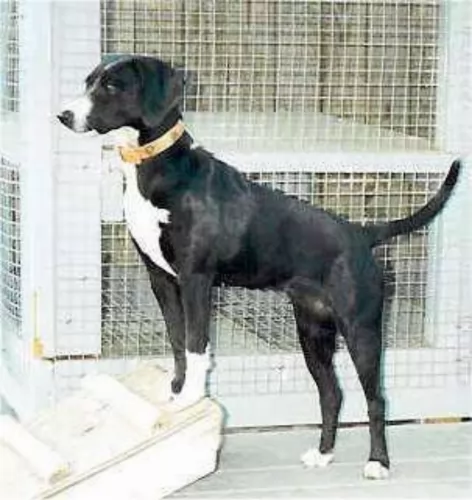 The Stephens Stock is a member if the Cur dog breeds. They are a scent hound bred in southeastern Kentucky by the Stephen’s family. For generations the dogs were simply known as the “little black dog”. The Cur breeds are dogs with a mixture of ancestry and the Stephens Cur is no different. However, the name Cur now means a working dog from the South in the United States. They were known as hunting and guard dogs, chasing wild boar, squirrel and raccoon. They were also called the Mountain Curs throughout Kentucky, Tennessee and Virginia.
The Stephens Stock is a member if the Cur dog breeds. They are a scent hound bred in southeastern Kentucky by the Stephen’s family. For generations the dogs were simply known as the “little black dog”. The Cur breeds are dogs with a mixture of ancestry and the Stephens Cur is no different. However, the name Cur now means a working dog from the South in the United States. They were known as hunting and guard dogs, chasing wild boar, squirrel and raccoon. They were also called the Mountain Curs throughout Kentucky, Tennessee and Virginia.
These mountain working dogs came close to extinction by the 1940’s but four separate breeders set out to save the Mountain Curs. They were the founders of the Mountain Cur Club and involved Woody Huntsman of Kentucky, Carl McConnel of Virginia, Dewey Ledbetter of Virginia and of course Hugh Stephens of Kentucky. Later the name of the club was changed to the Original Mountain Cur Breeders Association or OMCBA. The Mountain View Cur, the Treeing Cur and the Stephens Stock Cur were the results of their efforts.
In the 1970’s Stephen’s decided that his Cur was different from the original Mountain Curs and should be a separate breed. He formed the Stephen’s Breeders Association and the breed was recognized as distinct from other Curs. However, it was not recognized by the UKC (United Kennel Club) until 1998.
The Circassian Orloff Wolfhound had many of the characteristics of any sighthound. He has strong straight legs and they are longer than most sighthounds which allows the Circassian to run amazingly fast. The head is long, the muzzle is wide, and the eyes are large and dark. They have a deep chest and medium tail. They also have a graceful and aristocratic demeanor.
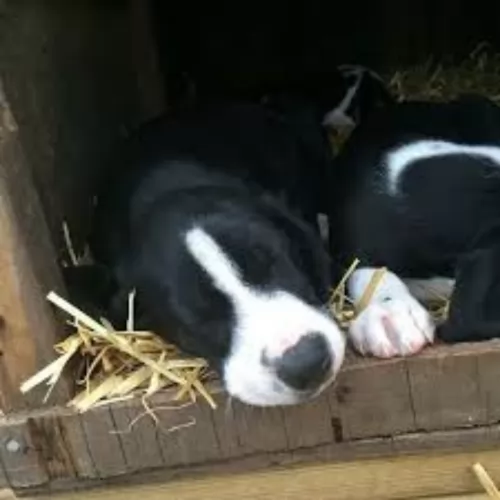 The Stephens Stock Cur is a breed of medium size, dark dogs – either very dark grey or black. Their heads are domed, and the muzzle is short with dark eyes. The breed’s chest is broad and deep with a neck of medium length and either a rough or smooth coat. They are smaller than the other Curs like the Black Mouth Cur or the Mountain View Cur.
The Stephens Stock Cur is a breed of medium size, dark dogs – either very dark grey or black. Their heads are domed, and the muzzle is short with dark eyes. The breed’s chest is broad and deep with a neck of medium length and either a rough or smooth coat. They are smaller than the other Curs like the Black Mouth Cur or the Mountain View Cur.
They are strong and capable of treeing their prey. Their body is longer than it is high, and they have powerful and long legs. Their appearance is sleek and elegant. The nose is dark and square, and their stance is alert and that of a watchdog. This is an athletic hunting dog that is aggressive in the field and chilled at home.
Fun and games are right in this breeds wheelhouse. They love to run. They need to run. Their activity level is very high, and they need lots of space and regular exercise. They are very intelligent and need mental stimulation as well. They are great at lure coursing and they love racing of course
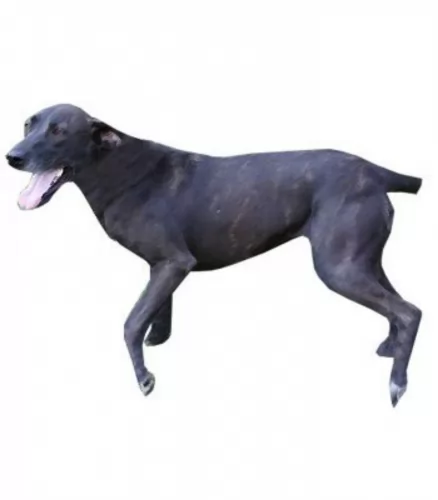 1. Children friendliness - They are tenacious on the hunt but once at home they love children.
1. Children friendliness - They are tenacious on the hunt but once at home they love children.
3.Adaptability They are adaptable if you can get them the exercise, they need every day. They won’t do well in an apartment without going to play and run somewhere else every day.
Again, little is known about the health of this ancient breed, except to propose that it faces many of the same challenges as the Greyhound. This would include skin irritation, bloat, osteosarcoma and esophageal achalasia.
Esophageal achalasia is rare and affects the esophagus’ muscles. The upper muscles can’t relax and that causes the lower muscle or sphincter not to open and no food can get to the stomach.
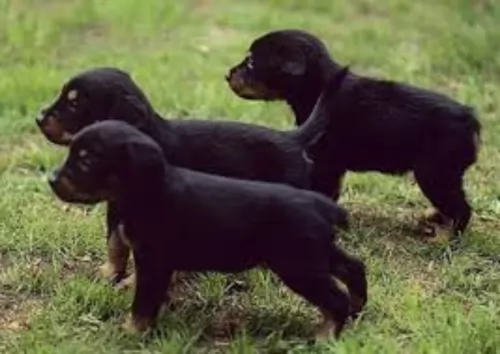 The Stephens Stock Cur is a fairly healthy breed, fairly isolated in the hills and mountains of Kentucky and Tennessee. They are prone to a few health conditions but there are no genetic and breed specific issues.
The Stephens Stock Cur is a fairly healthy breed, fairly isolated in the hills and mountains of Kentucky and Tennessee. They are prone to a few health conditions but there are no genetic and breed specific issues.
• Ear and Eye Infections. Keep them clean and keep debris out of both ears and eyes after hunting.
This dog is a lean running machine. Do not overfeed. It is also better to feed him two to three times a day in smaller portions rather than one large meal.
They tend to be allergic to insecticide and anesthesia. It’s best not to treat your yard for insects if your Circassian Orloff Wolfhound will be out in it.
Fun and games are right in this breeds wheelhouse. They love to run. They need to run. Their activity level is very high, and they need lots of space and regular exercise. They are very intelligent and need mental stimulation as well. They are great at lure coursing and they love racing of course.
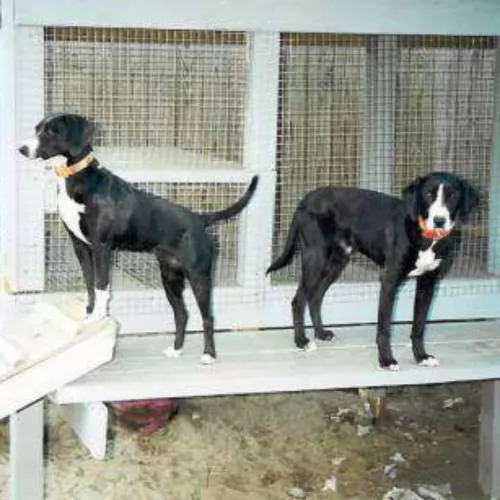 1.Feeding the puppy -Feed puppies a quality food desired for medium breed, high energy dogs. Puppies should eat 3 times a day about a total of 2 cups.
1.Feeding the puppy -Feed puppies a quality food desired for medium breed, high energy dogs. Puppies should eat 3 times a day about a total of 2 cups.
2.Feeding the adult Feed a high quality dog food with plenty of protein and designed for medium size dogs. Feed a total of 3 cups over 2 meals a day.
4. Games and Exercises – This is a very high energy treeing hunting dog with remarkable speed and agility. They need exercise – both physical and mental. One walk a day will not do it for these dogs. Have a fenced in yard or take them to organized activities like field trials, agility, flyball, hunting, search and rescue or barn hunt. They love to hunt with their people.